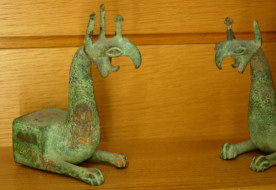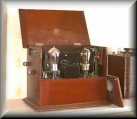Radio Drama Essay - some specific issues
| Topic: Is radio blind or invisible? |
| Why is there so little publicity about the radio drama director? - auteur |
| ambiguity of sounds which are not verbal |
| THE 'BODY' IN RADIO DRAMA |
Here are some other issues suggested in 'Playing By Ear'
| Beck, Alan, 'Playing By Ear' - 3.2 Radio and the Digital Age at http://www.kent.ac.uk/sdfva/stp/ |
| 3.6 & 3.10 'authorial' directors & the 'auteur' |
| 3.9 onwards - The BBC as the 'Hollywood' of UK radio drama |
See also Essay writing - general advice
Radio Drama bibliography
See here for fuller bibliography
| Andrew Crisell, Understanding Radio, Routledge, 1994 - and see Chapter 7 for radio drama |
| Shingler, Martin and Wieringa, Cindy, On Air. Methods and Meanings of Radio (London: Arnold, 1998) |
| Crook, Tim, Radio Drama, 1999, London: Routledge |
| Lewis, Peter, ed., 1981, Radio Drama, London: Longman. See Chapter 4, 'The nature of radio drama', by Frances Gray |
| Drakakis, John, ed., 1981, British Radio Drama, Cambridge: Cambridge University Press. |
| Peter Lewis , 'Opening and closing doors: radio drama in the BBC1', Radio Journal, 2004, (3) 161-176 |
| Beck, Alan, 'Playing By Ear - 1. What is the radio play? ' at http://www.kent.ac.uk/sdfva/stp/ |
| Beck, Alan, 2002, The Death of Radio? An essay in radio-philosophy
for the digital age', electronic book published by Sound Journal, http://www.kent.ac.uk/sdfva/rp/index.html Section 6 No 1 hierarchy of sound (6.11) - No 2 the 'economy rule' (6.13) - No 3 sonic continuity in broadcast (6.17) - No 4 the verbocentric (6.23) |
| Rodger, Ian, Radio Drama, 1982, London: Macmillan |
| Crook, Tim, 'International Radio Drama - Social, Economic and Literary Contexts' at http://www.irdp.co.uk/radiodrama.htm |
| Crook, Tim, 'The Psychological Power of Radio', at http://www.irdp.co.uk/hoax.htm |
| Garner, Ken, ''Putting the drama into dramatisation: in search of the source of current British Radio Drama' at http://www.kent.ac.uk/sdfva/sound-journal/Garner991.html |
SOME QUOTES
| "It's like being plugged into a circulating library with an endless supply of new books." Alan Ryan 'Sunday Telegraph' 1987 |
| "As with all forms of story-telling that are composed in words, not in visual images, radio always leaves that magical and enigmatic margin, that space of the invisible, which must be filled in by the imagination of the listeners" Angela Carter. Preface to the Collected Plays, 1985 |
| "Radio's strength is its immense flexibity, adaptability and suitability for a modern and active life. It suits people who move around a lot; It suits people who are busy doing other things" ....... Mark Kenny - Daily Express 9-11-1988 |
| "The almost telepathic transference of images from mind to mind is the beauty and the glory of the radio play." Martin Esslin. The National Theatre of Air, 1964 |
| "Radio has really become the national playhouse. It is where
people who don't go to the theatre turn to hear the rearrangement of life
into drama, that curious process which can make sense of what happens,
help with pain, heal through Laughter." Gillian Reynolds. The Daily Telegraph, 8-8-1987 |
Topic: Is radio blind or invisible?
Debate between Shingler and Beck
| Beck, Alan, 1999, 'Is radio blind or invisible? A call for a wider
debate on listening-in', World Forum for Acoustic Ecology (WFAE), electronic
publication, http://interact.uoregon.edu/MediaLit/FC/readings/blind.html |
| Shingler, Martin and Wieringa, Cindy, On Air. Methods and Meanings of Radio (London: Arnold, 1998) |
| Beck - 6.7 I have kept with the term blindness (in spite of Shingler's 'the notion that radio is the most deficient medium is quite mistaken', 78) and I hope my discussion will show that it allows for contradictions within itself. Although I have ended up on the 'blind' rather than the 'invisible' side, I hope I have contextualised and widened the debate, and related it to other anxieties of the radio industry itself. These latter I believe should be openly declared as intellectual baggage, with the option that an individual radiowriter can declare himself or herself apart from them, to a degree. And also that there are other ways around the problem, particularly through cognitive sciences studies of the human sensorium and Merleau-Ponty's internalist model. |
| Why … define radio's status as a non-visual medium in terms
connoting impairment, disability and lack rather than positive attributes
such as power and magic? The repeated use of the words 'blind' and 'blindness'
to describe radio would suggest that those writing about radio consider
its lack of visuals to be a problem rather than a positive attribute: as
something to be overcome rather than exploited. (Shingler in Shingler and Wieringa, 1998, 74) See Radio Drama Reading List |
| But why call an entirely auditory medium 'blind'? There is, after
all, a significant difference between calling a medium 'entirely auditory'
and 'blind', given that the latter implies that something crucial is lacking
and that the medium is, therefore, inherently deficient. Why 'blind' and
not 'invisible'? … (Shingler and Wieringa, 74) |
| Hence radio would appear to be both a deficient (incomplete) medium
and one obsessed by its own limitations and inadequacies. The notion of
radio as blind and, in particular, the notion that all its formal characteristics
are essentially compensatory devices for its blindness, perpetuates this
view of an inadequate (even neurotic) medium, robbing it of any potential
virtue or strength it may have as a purely auditory form. (75) |
FURTHER ISSUES
| Why is there so little publicity about the radio drama director? See Beck, 'Playing by Ear', 3.2 Radio and the Digital Age - we are 'super-listeners' (Sergi 1999), & 3.10 'Auteur' radio drama? See Radio Drama Reading List |
| THE 'BODY' IN RADIO DRAMA The Death of Radio, Beck, 6.26: Radio drama characters are more likely to operate on each other verbally than physically. This is especially so as the sound effects of bodily motion in themselves - mostly rustling of clothing, and paralinguistic grunts and squeals, typed by Watson and Hill, 1997, 158 as non-verbal vocalizations - fail to signify unambiguously and unaided by description, for the most part. So nearly all of radio's performers are liable to be highly articulate: presenters, phone-in hosts, and play characters. They concentrate emotion and conflict in language. It is interesting to compare professionals versus amateurs in sports phone-ins, especially B.B.C. Radio 5 and Talk Radio phone-ins, typically after soccer matches, where the 'game' is floor-holding, verbal description and display, and status competition, often by insult (a pastime known as 'flyting' in medieval literature). |

Reception Theory - and the active audience
| See audiences (reception) |

ambiguity of sounds which are not verbal
| Radio has difficulty with non-verbal sounds - rustling, sound FXs etc. Radio drama uses description to explain. |
| How to create suspense in the plot, ambiguity, wrong clues, complexity, and certainties? |
| What about 'The Revenge' - which is non-verbal and excludes the technique of description also? |
| By contrast, film is assumed to be able to "fix" or "concretize" the film's indeterminate meaning, at both emotional and cognitive levels, and restore a sense of unity. The filmic apparatus is always said to be a challenge. This is done by various means, including editing and film music. So aspects of time, place and narrative within a film are made more convincing. |
Beck, Alan, 2002, The Death of Radio? An essay in radio-philosophy for
the digital age, electronic book published by Sound Journal,
http://www.kent.ac.uk/sdfva/rp/index.html
6.26
Radio drama characters are more likely to operate on each other verbally than physically. This is especially so as the sound effects of bodily motion in themselves - mostly rustling of clothing, and paralinguistic grunts and squeals, typed by Watson and Hill, 1997, 158 as non-verbal vocalizations - fail to signify unambiguously and unaided by description, for the most part. So nearly all of radio's performers are liable to be highly articulate: presenters, phone-in hosts, and play characters. They concentrate emotion and conflict in language. It is interesting to compare professionals versus amateurs in sports phone-ins, especially B.B.C. Radio 5 and Talk Radio phone-ins, typically after soccer matches, where the 'game' is floor-holding, verbal description and display, and status competition, often by insult (a pastime known as 'flyting' in medieval literature).
(Watson, J. and Hill, A., 1997, A Dictionary of Communication And Media
Studies, fourth ed., London: Arnold.)

Crook, 1999, 6-7 (Crook, Tim, Radio Drama, 1999, London: Routledge)
I think that radio drama has shared with stage theatre an evanescent art
form status. If the script does not survive and there is no permanent recording
how are we to evaluate the artistic experience? The title of the first
chapter of Lance Sieveking's publication on radio drama The Stuff of Radio
(1934) is 'Ghastly impermanence of the medium'. Most early radio plays
created by the BBC and other international broadcasting organisations have
not survived as mechanical records.
Very few mechanical records are made of stage productions. The script has
tended to survive for both forms in the same way that manuscript musical
scores have preserved the code of historic operas and musical presentations.
Without permanent record, radio drama is an ephemeral art form. It exists
in the moment of its produced performance. Peter Brook defined the experience
of stage theatre as RRA: 'repetition, representation, assistance'. The
third ingredient of his definition, 'assistance', is where stage theatre
and audio theatre experience their significant differences.

